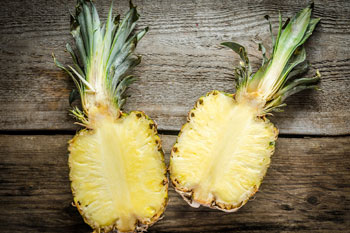
Bromelain
(brō'mə-lān') n.
1. An proteolytic (protein-digesting) enzyme derived from pineapple, used as an anti-inflammatory agent in homeopathy and as a meat tenderizer in the food industry.
Synonyms: Bromelin, stem bromelain (enzyme number: 3.4.22.32), fruit bromelain (enzyme number: 3.4.22.33).
Derivation: New Latin Bromel(ia), from bromeliad + (pap)ain. From Bromelia genus after Olaf Bromelius.
Source
Bromelain is a mixture of enzymes present in the pineapple plant that digest protein. Central and South Americans have used pineapple for centuries to reduce inflammation and treat indigestion. Bromelain was first isolated from the pineapple plant in the late 1800’s. It is used to treat numerous conditions but is particularly effective in reducing inflammation.
Benefits
This enzyme aids in relaxing tense, inflamed muscles and connective tissues. There are scientific studies that indicate bromelain has been used to treat: tendonitis, sprained ankles, inflammatory bowel disease, cancer, asthma, arthritis and joint pain, digestive disorders, allergies, ACL tears and more.
Uses
Most commonly used to fight inflammation and inflamed muscles and connective tissues. It is also used to speed healing from surgery and injuries. Due to its powerful anti-inflammatory characteristics, it is used to fight acute or chronic joint pain.
Forms (delivery methods)
Liquid, tablets and capsule to be taken by mouth. A topical version is sometimes used by healthcare providers to treat severe burns.
Side Effects
Those taking blood thinners should consult a physician before taking any supplement that includes bromelain as it aids in the prevention of blood clots.

